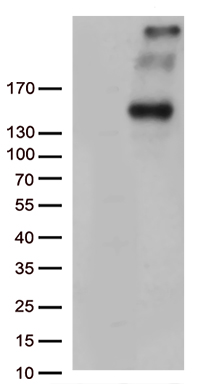PCDH15 (19H14) Mouse Monoclonal antibody
PCDH15 (19H14) Mouse Monoclonal antibody
- 产品详情
- 实验流程
- 背景知识
Application
| WB |
|---|---|
| Primary Accession | Q96QU1 |
| Reactivity | Rat, Human, Mouse |
| Clonality | Monoclonal |
| Calculated MW | 216069 Da |
| Gene ID | 65217 |
|---|---|
| Other Names | Protocadherin-15, PCDH15, USH1F |
| Dilution | WB~~1:1000 |
| Storage Conditions | -20℃ |
| Name | PCDH15 |
|---|---|
| Synonyms | USH1F |
| Function | Calcium-dependent cell-adhesion protein. Essential for maintenance of normal retinal and cochlear function. |
| Cellular Location | Cell membrane; Single-pass type I membrane protein. Note=Efficient localization to the plasma membrane requires the presence of LHFPL5. |
| Tissue Location | Expressed in brain, lung, kidney, spleen and testis. Found also in the inner and outer synaptic layers, and the nerve fiber layer in adult and fetal retinas. Found in the supporting cells, outer sulcus cells and spiral ganglion of fetal cochlea Expressed in cytotoxic tumor-derived T- and NK-cell lines as well as biopsies of nasal NK/T-cell lymphomas. Not detected in normal or in vitro activated peripheral blood cells, CD4 or CD8 lymphocytes or NK cells. Isoform 3 is expressed in brain, heart, cerebellum and kidney CD1 isoforms, such as isoform 1, have a limited pattern of expression and is detected in testis, retina and cochlea. CD2 isoforms, such as isoforms 4 and 5, are expressed in heart, kidney, thymus, spleen, testis, retina and cochlea. CD3 isoforms, such as isoform 6, are widely expressed. |
For Research Use Only. Not For Use In Diagnostic Procedures.
Provided below are standard protocols that you may find useful for product applications.
BACKGROUND
This gene is a member of the cadherin superfamily. Family members encode integral membrane proteins that mediate calcium-dependent cell-cell adhesion. It plays an essential role in maintenance of normal retinal and cochlear function. Mutations in this gene result in hearing loss and Usher Syndrome Type IF (USH1F). Extensive alternative splicing resulting in multiple isoforms has been observed in the mouse ortholog. Similar alternatively spliced transcripts are inferred to occur in human, and additional variants are likely to occur. [provided by RefSeq, Dec 2008]
终于等到您。ABCEPTA(百远生物)抗体产品。
点击下方“我要评价 ”按钮提交您的反馈信息,您的反馈和评价是我们最宝贵的财富之一,
我们将在1-3个工作日内处理您的反馈信息。
如有疑问,联系:0512-88856768 tech-china@abcepta.com.























 癌症的基本特征包括细胞增殖、血管生成、迁移、凋亡逃避机制和细胞永生等。找到癌症发生过程中这些通路的关键标记物和对应的抗体用于检测至关重要。
癌症的基本特征包括细胞增殖、血管生成、迁移、凋亡逃避机制和细胞永生等。找到癌症发生过程中这些通路的关键标记物和对应的抗体用于检测至关重要。 为您推荐一个泛素化位点预测神器——泛素化分析工具,可以为您的蛋白的泛素化位点作出预测和评分。
为您推荐一个泛素化位点预测神器——泛素化分析工具,可以为您的蛋白的泛素化位点作出预测和评分。 细胞自噬受体图形绘图工具为你的蛋白的细胞受体结合位点作出预测和评分,识别结合到自噬通路中的蛋白是非常重要的,便于让我们理解自噬在正常生理、病理过程中的作用,如发育、细胞分化、神经退化性疾病、压力条件下、感染和癌症。
细胞自噬受体图形绘图工具为你的蛋白的细胞受体结合位点作出预测和评分,识别结合到自噬通路中的蛋白是非常重要的,便于让我们理解自噬在正常生理、病理过程中的作用,如发育、细胞分化、神经退化性疾病、压力条件下、感染和癌症。






